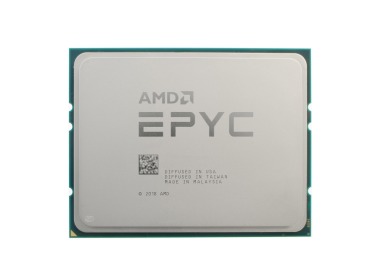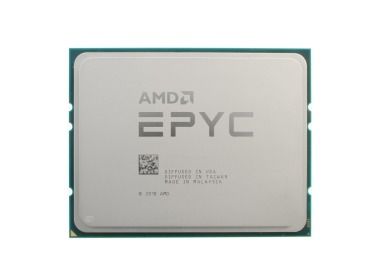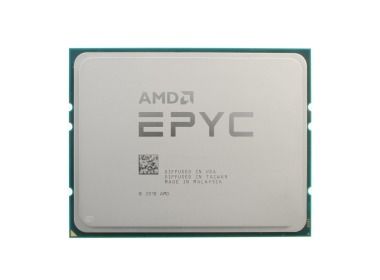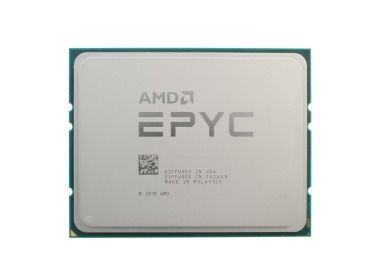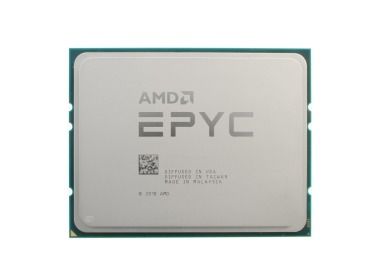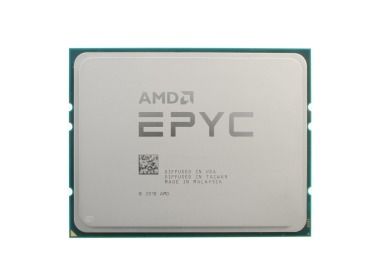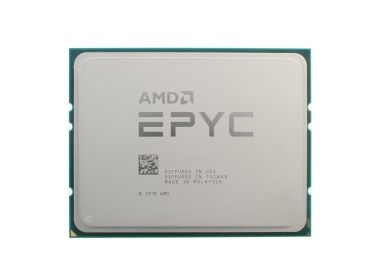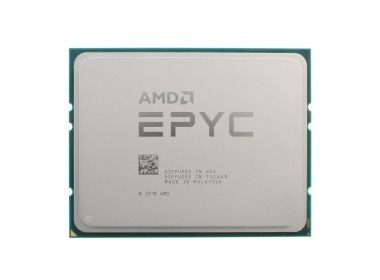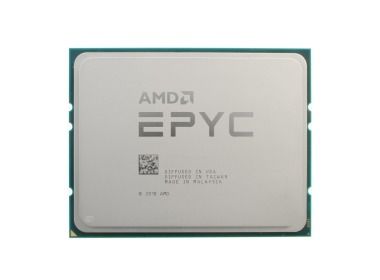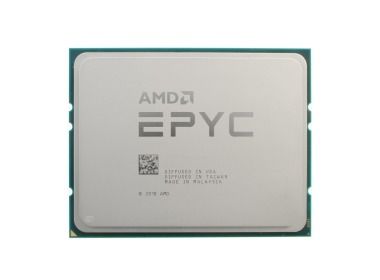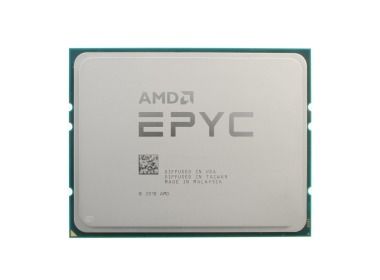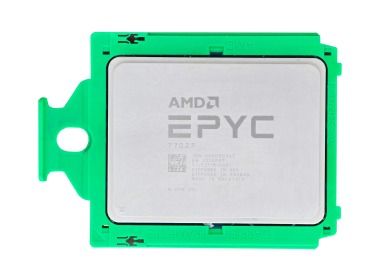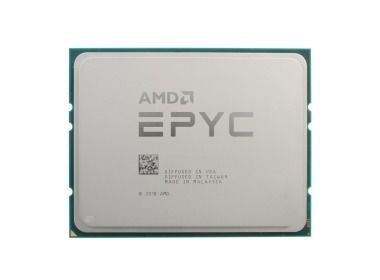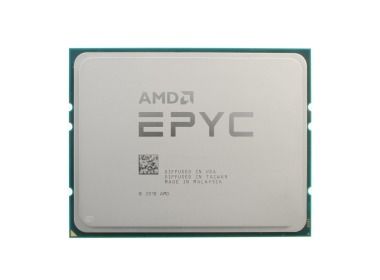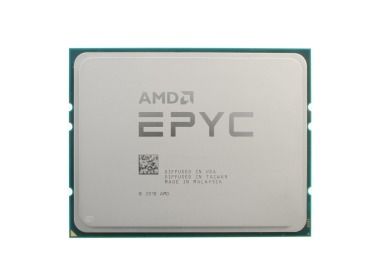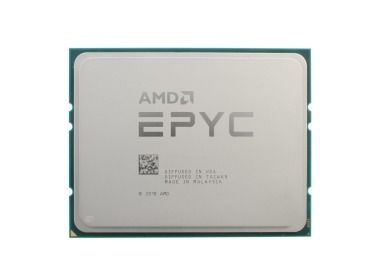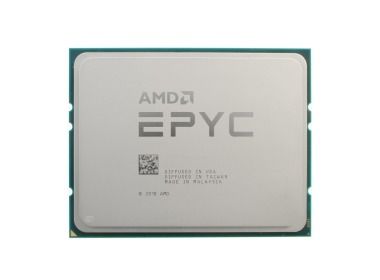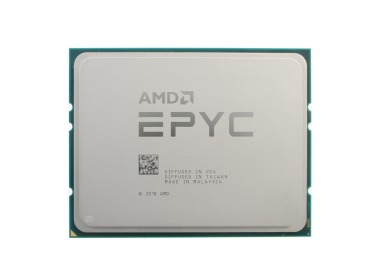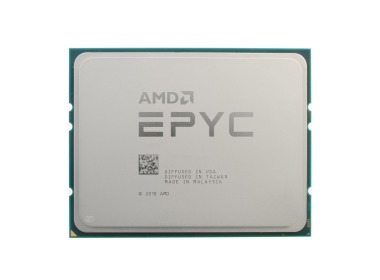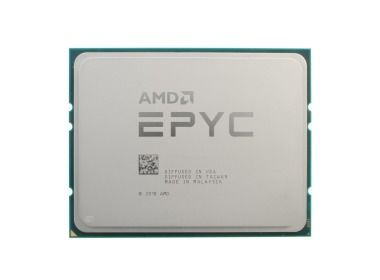- Processor Dell EPYC 7402 DELL ONLY 24-core 2.8GHz 128MB 180W 100-000000046-DELLTechnical parameters: Core Count - 24 Number of threads - 48 Base clock frequency - 2.8GHz Turbo clock frequency - 3.35GHz Cache - 128MB Lithography - 7nm TD...Calculating delivery time...In stock 8Warranty 12 monthsPLN 300.00 PLN 243.90
- Processor AMD EPYC 7262 8-core 3.2GHz 128MB 155W 100-000000041Technical parameters: Core Count - 8 Number of threads - 16 Base clock frequency - 3.2GHz Turbo clock frequency - 3.4GHz Cache - 128MB Lithography - 7nm TDP ...Calculating delivery time...In stock 5Warranty 12 monthsPLN 569.99 PLN 463.41
- Processor AMD EPYC DELL ONLY 7252 8-core 3.1GHz 64MB 120W 100-000000080Technical parameters: Core Count - 8 Number of threads - 16 Base clock frequency - 3.1GHz Turbo clock frequency - 3.2GHz Cache - 64kB Lithography - 7nm TDP -...Calculating delivery time...In stock 5Warranty 12 monthsPLN 650.01 PLN 528.46
- Processor AMD AMD EPYC™ 7252 8-core 3.1GHz 64MB 120W 100-000000080Technical parameters: Core Count - 8 Number of threads - 16 Base clock frequency - 3.1GHz Turbo clock frequency - 3.2GHz Cache - 64MB Lithography - 7nm TDP -...Warranty 12 monthsPLN 670.01 PLN 544.72Out of stock
- Processor AMD EPYC 7401P 24-core 2GHz 64MB 170W PS740PBEVHCAFTechnical parameters: Core Count - 24 Number of threads - 48 Base clock frequency - 2GHz Turbo clock frequency - 3GHz Cache - 64MB Lithography - 14nm TDP - 1...Warranty 12 monthsPLN 850.00 PLN 691.06Out of stock
- Processor Dell EPYC 7351P 16-core 2.4GHz 64MB 170W PS735PBEVGPAF-DELLTechnical parameters: Core Count - 16 Number of threads - 32 Base clock frequency - 2.4GHz Turbo clock frequency - 2.9GHz Cache - 64MB Lithography - 14nm TDP...Calculating delivery time...In stock 8Warranty 12 monthsPLN 1,000.00 PLN 813.01
- Processor AMD AMD EPYC 7302 16-core 3GHz 128MB 155W 100-000000043Technical parameters: Core Count - 16 Number of threads - 32 Base clock frequency - 3GHz Turbo clock frequency - 3.3GHz Cache - 128MB Lithography - 7nm TDP -...Warranty 12 monthsPLN 1,100.00 PLN 894.31Out of stock
- Processor AMD AMD EPYC™ 7001 Series 16-core 2.4GHz 64MB 170W PS735PBEVGPAFTechnical parameters: Core Count - 16 Number of threads - 32 Base clock frequency - 2.4GHz Turbo clock frequency - 2.9GHz Cache - 64MB Lithography - 14nm TDP...Calculating delivery time...In stock 1Warranty 12 monthsPLN 1,210.00 PLN 983.74
- Processor AMD EPYC 7371 16-core 3.1GHz 64MB 200W PS7371BDVGPAFTechnical parameters: Core Count - 16 Number of threads - 32 Base clock frequency - 3.1GHz Turbo clock frequency - 3.8GHz Cache - 64MB Lithography - 14nm TDP...Warranty 12 monthsPLN 1,250.00 PLN 1,016.26Out of stock
- Processor AMD EPYC 7702P 64-core 2GHz 256MB 200W 100-000000047Technical parameters: Core Count - 64 Number of threads - 128 Base clock frequency - 2GHz Turbo clock frequency - 3.35GHz Cache - 256MB Lithography - 7nm TDP...Warranty 12 monthsPLN 1,690.00 PLN 1,373.98Out of stock
- Processor AMD EPYC 7313 16-core 3GHz 128MB 155W 100-000000329Technical parameters: Core Count - 16 Number of threads - 32 Base clock frequency - 3GHz Turbo clock frequency - 3.7GHz Cache - 128MB Lithography - 7nm TDP -...Warranty 12 monthsPLN 1,749.99 PLN 1,422.76Out of stock
- Processor AMD EPYC DELL ONLY 7702P 64-core 2GHz 256MB 200W 100-000000047-DELLTechnical parameters: Core Count - 64 Number of threads - 128 Base clock frequency - 2GHz Turbo clock frequency - 3.35GHz Cache - 256MB Lithography - 7nm TDP...Calculating delivery time...In stock 38Warranty 12 monthsPLN 1,749.99 PLN 1,422.76
- Processor AMD EPYC 7702P 64-core 2GHz 256MB 200W 100-000000047-LENOVOTechnical parameters: Core Count - 64 Number of threads - 128 Base clock frequency - 2GHz Turbo clock frequency - 3.35GHz Cache - 256MB Lithography - 7nm TDP...Warranty 12 monthsPLN 1,749.99 PLN 1,422.76Out of stock
- Processor AMD EPYC 7452 32-core 2.35GHz 128MB 155W 100-000000057Technical parameters: Core Count - 32 Number of threads - 64 Base clock frequency - 2.35GHz Turbo clock frequency - 3.35GHz Cache - 128MB Lithography - 7nm T...Warranty 12 monthsPLN 2,010.00 PLN 1,634.15Out of stock
- Processor AMD EPYC 7352 24-core 2.3GHz 128MB 155W 100-000000077Technical parameters: Core Count - 24 Number of threads - 48 Base clock frequency - 2.3GHz Turbo clock frequency - 3.2GHz Cache - 128MB Lithography - 7nm TDP...Calculating delivery time...In stock 1Warranty 12 monthsPLN 2,650.00 PLN 2,154.47
- Processor AMD EPYC 7352 DELL ONLY 24-core 2.3GHz 128MB 155W 100-000000077-DELLTechnical parameters: Core Count - 24 Number of threads - 48 Base clock frequency - 2.3GHz Turbo clock frequency - 3.2GHz Cache - 128MB Lithography - 7nm TDP...Warranty 12 monthsPLN 2,650.00 PLN 2,154.47Out of stock
- Processor AMD EPYC 7313 DELL ONLY 16-core 3GHz 128MB 155W 100-000000329-DELLTechnical parameters: Core Count - 16 Number of threads - 32 Base clock frequency - 3GHz Turbo clock frequency - 3.7GHz Cache - 128MB Lithography - 7nm TDP -...Warranty 12 monthsPLN 2,800.00 PLN 2,276.42Out of stock
- Processor AMD EPYC 7502 32-core 2.5GHz 128MB 180W 100-000000054Technical parameters: Core Count - 32 Number of threads - 64 Base clock frequency - 2.5GHz Turbo clock frequency - 3.35GHz Cache - 128MB Lithography - 7nm TD...Warranty 12 monthsPLN 3,325.00 PLN 2,703.25Out of stock
- Processor AMD EPYC 7543 32-core 2.8GHz 256MB 225W 100-000000345Technical parameters: Core Count - 32 Number of threads - 64 Base clock frequency - 2.8GHz Turbo clock frequency - 3.7GHz Cache - 256MB Lithography - 7nm TDP...Calculating delivery time...In stock 2PLN 3,450.00 PLN 2,804.88
- Processor AMD EPYC 9754 128-core 2.25GHz 256MB 360W 100-000001234-DELLTechnical parameters: Core Count - 128 Number of threads - 256 Base clock frequency - 2.25GHz Turbo clock frequency - 3.1GHz Cache - 256MB Lithography - 5nm ...Calculating delivery time...In stock 2Warranty 12 monthsPLN 11,800.01 PLN 9,593.50
- Processor AMD EPYC 9754 128-core 2.25GHz 256MB 360W 100-000001234Technical parameters: Core Count - 128 Number of threads - 256 Base clock frequency - 2.25GHz Turbo clock frequency - 3.1GHz Cache - 256MB Lithography - 6nm ...Warranty 12 monthsPLN 12,000.00 PLN 9,756.10Out of stock
Just a few years ago, an AMD server CPU was a curiosity. Today – for many, it's the default choice. AMD processors in server environments today mean not only EPYC but also select Threadripper Pro models, which in many applications (rendering, virtualization, HPC) perform better than classic Xeons. If you care about a high core count, high memory bandwidth, and modern interfaces (PCIe 4.0, DDR4/DDR5), AMD offers a distinct advantage. And thanks to Hardware Direct's offerings – also real savings.
Why Choose AMD for Your Server?
The Zen architecture has proven that AMD processors are now major contenders – often offering more cores, a better performance-to-price ratio, and superior PCIe support compared to the competition. Models from the EPYC 7002 and 7003 series (Rome and Milan) allow for the use of up to 128 PCIe 4.0 lanes – which means more expansion cards, faster NVMe drives, and more flexible configurations. For application server virtualizers (Proxmox, VMware) or database environments (PostgreSQL, MS SQL), AMD offers what administrators expect: stability, compatibility, and raw computing power without artificial SKU segmentation.
What Distinguishes AMD Server Processors from the Competition?
One of AMD's key strengths is its unified platform – the SP3 socket has supported various CPU generations for years, which simplifies future upgrades. In single-socket models (e.g., 7401P, 7702P), you get up to 64 cores and 128 threads without needing to duplicate motherboards, controllers, or power supplies. This means that even on a limited budget, you can set up an environment capable of handling several hundred virtual machines or processing terabytes of data daily. Additionally, AMD invests in energy-saving technologies – Precision Boost 2, Proactive Power Scaling – which means less heat generation and lower power consumption without a drop in performance.
What Specifically Will You Find at Hardware Direct?
At Hardware Direct, you'll find AMD processors across a wide range of prices and power – from 8-core models for NAS storage to powerful 64C/128T chips for private clouds and AI. For example: the EPYC 7401P 24C/48T for just under 750 PLN (after discount), the EPYC 7702P 64C/128T priced below 1,600 PLN, as well as newer Milan series models (7313, 7373X) with a huge amount of cache and support for 3D V-Cache. All models are tested, compatible with SP3 motherboards, and ready to work right away – without needing to fiddle with BIOS or microcodes.
AMD Server Processors in Practice – For Whom Is It a Smart Choice?
AMD processors are a good choice for those who want flexibility in expansion and control over TCO. They are excellent for hosting companies (many VMs per socket), in Big Data and streaming infrastructure (many threads, large cache), and also in classic SQL servers, Elasticsearch, or backup systems where I/O and memory bandwidth are crucial. If you need a platform that won't limit you from the start and won't require replacement every year – AMD is a solid investment.








